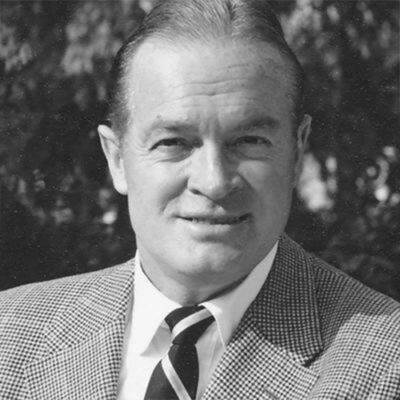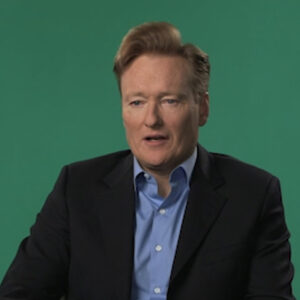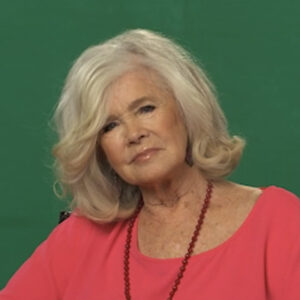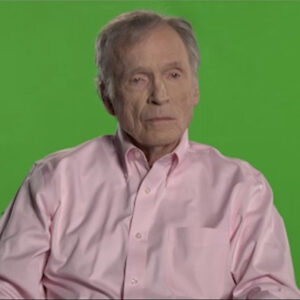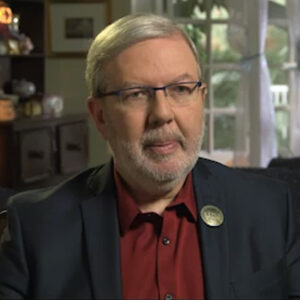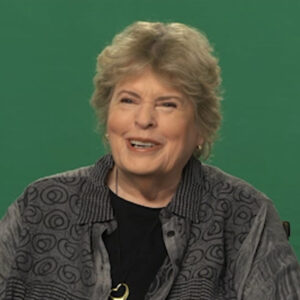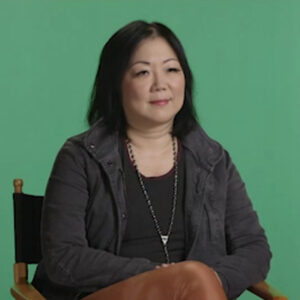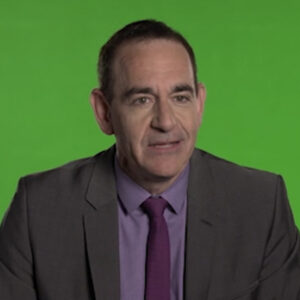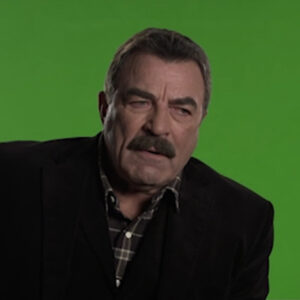Speaker I did spend a lot of my life sort of very impressionable years of my life and big moments, I think it was around in 82 when I started working with Mr. Hope and and he started only every school break, every Christmas special, every birthday show, every tour. He would call me his good luck charm. And and it was such such a sweet thing because he I just looked up to him for, you know, I would watch him as a little kid in the road pictures and and just always loved him. And then to be able to have that kind of day in and day out, the pace, the pace of it, the rehearsal, that kind of tutelage from the man himself, I learned a lot just by by watching.
Speaker But he became more of a like a father, father, grandfather figure in a way. But I would never say that to him because he didn’t want to think of himself like that if he wanted. He was a dandy. But I also learned how to he would take jokes away from me if if I got to a really big laugh and he would say, you’re too young for that.
Speaker I’m giving it to Marie Osmond. And I’d say, Bob, Bob, I made everybody laugh. Look, they’re all laughing. And he said to young, to you, it’s below the belt for a kid. And I thought, OK, here’s what I’m going to do. So I just didn’t I tanked all the rehearsals. I just would say the lines and just say them and look like I was looking for my marks and and kind of do the, you know, sort of pretend that I wasn’t really on my game or hadn’t found the funny yet. And and then when we would do it live, I would just bring it and you could just see in his eyes and, you know, he’d say, all right, OK, all right.
Speaker I said, Bob, I learned from the past, you can’t get mad at me. Yeah, I’m just I’m I’m your straight man. You got to know that. But you got to let me be what you taught me.
Speaker And and so I just I learned a lot about the the power in just a look and how the timing if you’re a split second too late or a split second too early, you’re just not on the funny the funniest of the funny, you know, and it really it it helped that all of his shows were sort of packed with, you know, stars and and just, you know, heroes of mine.
Speaker And I mean, and what other world would I have gotten to work with Lucille Ball?
Speaker You know, I mean, Mickey Rooney, you know, all these so many people just by being on his on his shows.
Speaker For those of us that didn’t have the pleasure, how would you describe him as a person like the Bob Hope or something like that? We all saw in the movies, on television. But when you it’s been an odd personality to me.
Speaker Bob had a a a very childlike excitement about things that you wouldn’t think somebody as seasoned and coming from vaudeville and and really, you know, and a ladies man and and, you know, you hear all that all of those stories and extremely respectful of me as a as a young girl and of not exploiting any any of that. But he also would get excited about things like ice cream or, you know, he drank his cranberry juice every day. And that’s what he you know, he said it kept him healthy and he liked that he was mint chocolate chip ice cream. And he he he was like enamored with this new thing called a toaster oven, where you could put bread with cheese and then put another piece of bread on top of it.
Speaker And you could you cut off the edges because he didn’t he didn’t like edges on his bread and you could put it in there and it just cooked it. And I was like, yeah, that’s the toaster oven, right? Yeah. Because I’m going to I’ll make you I’ll make you like. So he made me cheese sandwiches like you, and you’re sitting there in this massive, you know, Haven Hearst or wherever, this mansion that he’s gotten and he’s Bob Hope is cooking you a cheese sandwich. There was something very sweet.
Speaker I mean, and it’s such a contrast to the fierceness that he had when it came to the material and his laughs and his, you know, his monologue and and who got what joke and and how to really balance it all. And and then the flip side was this, you know, man who was sort of very sweetly making jokes we were in know a Fat Albert transport plane. And the only place to sleep because you had to all be strapped in was above me, where all the duffel bags and the baggage was. And he was from that vantage point, we could see the air fueling and, you know, little things like he he pulled out his exact card and gave it to the pilot, you know, as we were in our in air fueling. And there’s, you know, I mean, above us, you know, or whatever the hell it was. And it comes down the moonlight and, you know, it’s just an extraordinary he always had always had a little something in his pocket as a joke.
Speaker So he could be funny without his writers.
Speaker I think he sometimes was funnier without his writers. I think I was fascinated by the show. Whenever we would do a show, he could memorize anything. Just it was the cue cards. The words got bigger and bigger and bigger over the years and for his eyesight and he wouldn’t, you know, remember his lines.
Speaker And so and he’d he’d always be look, I mean, you used to get mad at me for memorizing everything because he called me show off and and secretly he liked it. But he also would kind of pick pick on me. And that was in those moments. And but so couldn’t couldn’t have he didn’t have a capacity for the material and the material changed all the time. But he could go on stage in front of thousands and thousands of people and talk non-stop for an hour and a half, completely memorized the entire thing.
Speaker And I always thought that was just a really interesting part of his brain, because that’s his at his core, you know, that’s what he he was he was an entertainer. It didn’t matter what time of day or night it was when we landed or arrived at some place, not having anything to do with the location of the show. But we would fly into Cairo or we’d have a layover in some city. He’d he’d say, come on, get up, get up. We’re going to go do just a quick like fifteen to twenty, take twenty minutes to do it. So you do that part. No one will sneak right into and then do the bit about the and I’d be like, oh ok, ok. And so we’d be sworn in at four o’clock in the morning but there would be a welcoming, you know, people with welcoming banners and stuff and you never know if you didn’t know if they were going to go to the show or they weren’t going to get the show. But he was entertaining everywhere all the time. So you had no there was no rest for it. And it wasn’t even just the show must go on. The show keeps going on all the time everywhere.
Speaker Was he Bob Hope, the performer 24/7? You ever see the mask come down?
Speaker You know, he. I think he had two very different personas, you know, because he would get as he got a little bit older, too. He had a temper, you know, and he would get grouchy about things. And he and he didn’t like he wanted things to be perfect. But he was humorous all the time, but not all the time. Like, not look at me. Look at me. I’m funny and exhausting. You know, he was able to do that. Once you were on that stage, though, it was like a light switch came on. But there was a definite I don’t know if karma is the right contemplative part of him all the time, but he loved making me laugh and he loved when we were together. And he also loved making funny faces. So whenever I’d say good bye bye, Bob, let’s just take a picture here, because we’re in front of, you know, something. And, you know, he’d always go, you know, or do something like this or or just stick his tongue out and, you know, and it was like there was the playfulness to him on the flip side of his sort of fierce professionalism. And he’s tough on it, tough on his writers. I mean, really, just everything just had to keep getting better, had to keep getting better, had to keep. But again, he also didn’t want anybody to really get out, you know, laughed. Then he wanted to get the last laugh and the biggest laugh.
Speaker I’m intrigued by what you said about what you don’t like about that, maybe with regard to the troops, with regards to performing in love with him, not the television shows, but the the live performance for the troops. It was as if he came off the ground a little bit. You know, the minute he and he he would he would become energized and complete a different type of an energy. And he wanted every single member of the troupe, like every single person, to feel that he was doing the show just for them.
Speaker And he would go immediately in it in any city or any of the the the USO shows that we did, whether we were in America or in Beirut or anywhere, he would get all the local jargon of that particular camp, whatever, and he would get you know, he’d learn the nicknames for the mess halls and he’d learn the nicknames for the bar that the that they sneak out to and they’re not supposed to. And so he would sort of make each show slightly individual and he loved doing this for them so that they got the feeling that he really got it and he really had that they mattered to him.
Speaker And it harkened back obviously to way, way, way back in the day. I mean, he was the one. And what would make Dolores so crazy with anger was he he would go where he wasn’t supposed to go, where it wasn’t safe. So he you know, we were supposed to stay on the USS Kennedy and we were staying on the USS Kennedy. He snuck out at dawn to go ashore and did a little impromptu sort of meet and greet. Well, all hell broke loose when he got back. She was so mad. He got such a scolding. And the one person that really could set him straight was was Mama saying she would. And if they spelled her name wrong on the cake, she would go out and buy herself a nice bottle of some kind. And she was like, she’s like, he’s so cheap. It’ll teach him to not not not smile, have him spell my name, her name wrong Dollo instead of the yellow. And it became this whole kind of kind of thing that, you know, just funny to watch him get so upset that he had to buy her a piece of jewelry for you while you were busy doing other things.
Speaker What for you was important about entertaining the troops?
Speaker You know that I was so wanting to be a part of the, you know, being my age and not having lived through many of the wars and the being a part of any of the war effort. This was my first sort of feeling about being in a. Part of something and trying to give back to these young faces, you know, and I and I think that even even though I was quite young, I felt that it was I had never felt a sense of duty before. I just was a kid living in America. You know, you didn’t you really it was the 70s and 80s, you know. And so I think that it it made me feel so proud to say thank you in a in a very physical and a physical way. So it mattered to me. What shocked me was, I mean, you talk about an appreciative audience.
Speaker I mean, you could just go like that and they would warp and holler and and just take their T-shirts. And, you know, I mean, from an ego standpoint, it’s incredible. You know, there are just and, you know, if you just do this with your leg a little and you show a little leg, it’s like and it was this fascinating sort of the alchemy of all of that, you know?
Speaker And, you know, I had to be careful because Bob loved it, but he also didn’t want to be you know, the pacing of the comedy is a certain thing and you don’t want to upstage him. And and and I’ll never forget, they lost our costumes and we did our costumes somehow got stuck in Cairo. And my mom said, I always travel with your shoes, never put your shoes in the in the suitcase. So the bags are gone. We had no costumes and my mother says, I got it. She gets and Jilian and it’s all all of us. We’re all there. And and she says, go find a man who was similar in size to you and get a shirt of his one of the servicemen so that all the women put on these shirts, these regulation shirts and high heels. And I didn’t tell them because I knew he would say I couldn’t do it. So and my and my mom said I said, Mom, what do I do? Toytown I don’t tell them, don’t tell him. She said he’s not going to let any of you do it. And I can guarantee you it’s going to be a it’s going to be a hit. And I was like, oh God, here I am, you know, going against papa, you know, and we really had no other choice because other otherwise that we were in, like, sweats and, you know, we didn’t have any other thing to do. So we were waiting in the wings.
Speaker And he takes one look at me and I can’t come out here like that can come out here like that. And I said, I can’t I don’t have a choice. We don’t have any clothes. I said, it’s happening. It’s happening.
Speaker And we all walked out and the place went insane because it was like legs just, you know, all these legs, these women’s legs. And and it gave him time to do one of his looks, you know, so he turned it and, you know, he along gaited the moment, the applause then got high more then the whipping. Then it kind of died down. Then it came back again because he threw another look like he he was the puppeteer.
Speaker And it was it was really interesting. And I thought he was going to just rip my mom’s head off. But what he used to make my mom do is whenever he was rehearsing a live show of just him, his show not not at not the specials, he would make my mother sit in the front row during the rehearsals. And if she laughed, he kept a joking. And if she didn’t laugh, he would make a note of it and go, OK, so we got to work on that one. He wouldn’t ask her for advice, but he wouldn’t and he wouldn’t consult with her, but he would just do that. And one day I was in college and I was it was exam time and I was studying and he had come to Princeton to get a wig, Clio Society Award, which is the theater, the theater group there. And he had to give a big speech and acceptance speech. So I get called out of class like the proctor. Somebody comes and says, you’ve requested at the at the NSA. And I thought maybe because of the NSA and I’m sitting exam time, I’ve got and I was wearing just a ridiculous outfit just because, like a lucky outfit, dumb thing. And he they said he wasn’t Mr. Hope is in a room, whatever, and he wants to see you. So I go running. Of course, I ran across campus and I get off the elevator and I hear but ba ba ba ba ba ba ba ba ba ba ba ba ba.
Speaker And I’m thinking, no, that can’t be Bob like. Really. So I’m following the sound, sure enough, he’s got the door open in a rather big hotel. I mean, not big, but there were a lot of rooms on that floor and he’s putting on pancake makeup in the little teeny bathroom mirror and he goes, oh, hey, kid. He goes, got the lights. And these these are these bathrooms are so terrible. And he said.
Speaker They were they let you wear that to school, I was like, you just called me in class, I’m sorry, I’m not dressed appropriately. These are my good luck pants and I’m going through exam time. I said, what can I do? We said, sit down. I said, all right. He said, All right, tell me if it’s funny. Ran through his entire acceptance speech and monologue for about four. He was like a forty, forty five minute and and he said, OK, funny, funny, not funny. What’s funny about this one. What’s the name of the whatever. And I’m sitting there thinking this is such a surreal moment for me because I he’s asking me to tell him he’s OK, you know. And I thought you’re you’re a legend. You know, you’ve you’ve changed the course of my life. I mean, he’s the only person that ever thought to give me comedy and, you know, that talk about on the job training from the best. You know, you’re you’re you just can’t believe that you don’t get that anywhere.
Speaker And and now here I was sitting there and nervous. I always get nervous around him because I always wanted him to love me, you know, I always wanted him to approve of me. I’d sneak ice cream and I get you know, I’d find out things in advance and I’d, you know, and I was like the like a little pet, you know? And I just I loved that role. I loved the caretaking, you know, being completely codependent and loved it was perfect for it, that kind of role.
Speaker Many, many people have talked about how this ability to exist now, but we talked about how meticulous he was in preparing his monologues and how much your analysis of what you went through the years, about how much attention being paid to the eye, the attention that he paid to his monologue, really, I think stemmed from the older part of him being a starting out and going on these stages and being afraid to bomb and looking it up, all these faces looking up and not wanting to fail and yet needing their approval so much that it was that type of fuel for him.
Speaker He was very he was a perfectionist, but he knew that he set the tone for the entire because that monologue, that sort of very naked moment of and that something and that’s something, you know, where he would he would read the room and feel it.
Speaker So it was like it was a live organism, his his monologue. But he had to perfect it so that he then had the energy to really read the room, read the audience, read the. So I think he knew that that was that set the tone. It was going through the starting gate. It was the you know, the gun being shot, the whistle being blown, you know, whatever that is. He then had to really guide that that ship. I mean, he knew what people wanted. And he you know, when he mixed mannerisms with with, you know, sweet jokes, off color jokes, but not too off color jokes.
Speaker But then when he got when he went real blue, it was really funny.
Speaker But you could only go blue in certain like there was a bluer version when the cameras weren’t rolling, you know, but he to me, it felt like a live thing to him that this sort of this monologue, this monologue was very was a huge piece of all of it, because from that then everything followed.
Speaker That’s great. That’s great. Here’s a guy who talks success, you know, every form of mass energy. Vaudeville to Broadway, to radio theater, that you’ve done a number of things. How hard is that to be the best in so many fields and to do that for so many years?
Speaker You know, I I can’t speak for for him because I can only say what I the what it is for me, I think it’s a combination of ambition, ego, insecurity and and a it’s it was his identity.
Speaker That was what I saw. I mean, he wasn’t going to stop. He was never going to stop. And I, I mean, I’m a fellow Gemini where our birthdays are very close.
Speaker I understand that they’re going to have to give me the hook, like they’re going to have to yank me off whatever stage I’m being invited to be on or film or screen or whatever, because it is it’s so tied up with my identity of who I am. There’s something about for me, comedians and and comedy for me that is I’m not I can’t live without it. And I saw that in him. So I think what that does is that it gives you longevity, doesn’t necessarily give you success, but it definitely gives you stamina and longevity. I mean, for me, changing mediums as much as I do it is born out of necessity because they don’t want you here now.
Speaker So you got to go over there and then they’re soon they’re tired of you and they don’t want you there either.
Speaker So you go to a different size screen and then all of a sudden it’s like, oh, well, you know, so, you know, go back, go back to theater like it’s like or oh, God, OK, I’ll write a book.
Speaker So it’s this sort of drive to or inability to not be able to stop. And I find that more with comedians than I do, I think comedians have a it’s live or die, you know, it’s all there was a result that you either get or you don’t. But it’s not arguable. You know, you can argue and drama that I gave it, you know, fabulous performance.
Speaker You just didn’t understand it, you know, but if you’re not funny, you just how funny. And it and that’s I think it’s different. I think it’s really pressured. I think it’s it’s nerve wracking. I think it’s and to be to do standup, that is I mean, I am not a standup comedian. I’ve tried, I’ve tried it. And I it’s just way too fraught for me. So that’s my fault. Sorry. I think this is my babysitter thinks I didn’t turn it off. Sorry. And turn it off. It’s my or team.
Speaker Yes. She said she was performing. It doesn’t make you forget it somewhere.
Speaker You said something about being on the USS Kennedy was one of the most emotional Christmases you ever had.
Speaker I had traditionally spent Christmas, you know, with my mom, and then a day after I go to my dad’s and but it to a certain extent growing up, it’s a it’s about getting stuff like, yeah, you go to Mass or you, you know, excited about giving your mom presents and but you really want the like you want that stuff.
Speaker And I had not really ever felt the beauty of being unselfish until I went to the US as we were staying on the USS Kennedy. And what they went what the lengths that that they went to to make us feel comfortable. They made you know, they made Christmas stockings out of, you know, exercise, sweat tube socks. And all of our names were written on them. And there was this very homemade sort of crafty feel. And the the cookies that people would send to them, they had they put little cookies in our in all of our bunks. And and they were trying to give to us and hear what it’s like here with these young faces that were possibly going to die for us and for our country. And it was I’d never been that close to that before. And I had never felt the real pure, pure joy of really not caring about yourself and getting stuff, you know what I mean? Like, it really it was a shock to me that it could that it could feel that good. You know, I was a kid, but you’re a good kid. You know, you want stuff. And and it was like to look at their smiles are for them to just say thank you, you know, and tears in their eyes and not being home. And they’re not being much older than I was.
Speaker You know, that was just an experience I, I didn’t anticipate feeling it to feel that powerful. I thought it would feel big and I thought it would feel historical to me because you’re flying around and in fighter jets and and Fat Albert planes and you’re landing on I mean, it’s like an action being in an action movie for real. And you’ve got flight suits and, you know, you got to dress up and, you know, I got to wear the Exos flight suit and and they were flattering on you.
Speaker And and but the the actual the way your heart just I mean, we cried every day. I cried every day. We would land in a new spot and we did two shows a day sometimes. And you know, when I would get like like, you know, oh my God. And he’d look and he’d say, that’s why we do it. That’s it. That’s why. And I’d be like, yes, yeah, yeah. OK. I know. I know. That’s right. It’s right. You know, and you and it didn’t make me it had nothing to do with politics. Like, I think that was what was fascinating to me too, was it was just purely about these human beings and the what how they appreciated just our time and telling stupid jokes.
Speaker You know, they go out of the walks in the bar and I mean, they’re like, you know, they weren’t metal jokes. They weren’t, you know, they weren’t they were just dopey. They were just entertainment and funny. And, you know, so that was just a it was indelible, that sort of feeling to me.
Speaker Yeah, that’s great. You spoke before about, uh, Dolores and jewelry. I’m not much interested in. What did you witness about the dynamics between the two of them?
Speaker She was the boss. I mean, Mrs. Hope played it right. You know, she was so loving, so strong, but really took care of him. I mean, she really she had a there was a very nurturing part, I think, to her about him. You know, she was the boss and he would call her the old lady or the boss or, you know, whatever. And and, you know, but she was tough. Like she was going to sing on every show because she was a singer and he fell in love with the voice when he saw. And then when he saw her, he fell in love with her. And it’s on the one hand what I saw as a little kid or what you wish your grandparents were. And I didn’t have any grandparents. I mean, one time I did. But I don’t know, though, and that was it. But she was tough, you know, and she’d say, no, no, don’t do that. Or she’d you know, she’d come on, get you get out. OK, OK. You look good now, you know, and he would just he would turn into this like a little boy right with her. And then I tell you, I’m going to get in trouble, you know, so sort of cute, but she was very strong, but I think she knew how to stake her claim and let him also have a long lead because he wanted it.
Speaker You know, he wanted all the girls to like him and he wanted to flirt with everybody and he wanted, you know, and that was who he was as a guy. And he had you know, it was he was virile, you know, like he was that’s what he was, you know, and he loved that kind of stuff.
Speaker I appreciated that it was sort of all bets were off with me, you know, and I was I was a kid to him. And so I appreciated that. But I watched she always had her eye on him. She always knew exactly what was going on. If something she didn’t like, if she didn’t like a person, they were not going to be on the show. If, you know, she didn’t like something, he would he would hear about it, you know, but never in front of never in front of me. I never saw it. But you could tell he could tell that they’d roll out that cake and I’d go, oh, you know. Or you know.
Speaker And she she made he.
Speaker Mrs. Hope, I think. Was also, at her core, an entertainer, and I think it must have been hard for her because he sort of his rise was so big and and he so famous and so big and for so long. And, you know, she kind of was in an era where it’s just the way for, you know, and then really. Oh, who is. We didn’t know. She did she does she saying, you know, and yet that’s what she started off as.
Speaker And so he would put her in every show. And and I thought, God, I’ve never really seen nepotism work the really right way. And I felt good for good for you get on that stage. And by now he’s your husband. I can give you a number. And that’s all she would do, is you do want to be a beautiful song at the end. It’s come out just absolutely glorious. And it was not going to not happen.
Speaker Oh, my parents do with their kids did regale you with stories of the old days.
Speaker And do you remember any stories that he seemed quite proud of or did he not?
Speaker Not he wasn’t a big you know, we didn’t have the time.
Speaker We were so busy rehearsing and you would go, oh, we all you were doing was working on material. And you come in the next day and the material would be all different. So you’d have to work on. So you had to keep your wits about you. And we didn’t have a lot of downtime. And but when we did, he was more interested in asking about me than, you know, every now and then.
Speaker If he was with Sammy Davis Jr. or something, you’d you know, I’d just sit in all their rehearsals and I’d just listen, you know, but they weren’t, let me tell you, a kid, the one about the you know, it wasn’t it wasn’t like that. You know, George Burns was like that. But this isn’t about him. But he he was much more of that type of person. But Bob would we just didn’t have a lot of time. We were working all the time.
Speaker That’s yeah, that’s OK.
Speaker We talked a bit about why he stayed too long.
Speaker I didn’t say too long, but I said very long.
Speaker A number of people have said if I stayed around to listen, I know who’s to say what are the rules.
Speaker It’s show business, you know, come on. It’s like let the guy do what he wants. You know, he’s done enough for people. I think it’s OK.
Speaker I mean, you know, I think, you know, I. I think you’ve got to know if you’re embarrassing yourself. But, you know, I don’t I can’t say I can’t say that there was a time he should have or shouldn’t have. I mean, you know, I’ll probably be that person to the ME, like, get off.
Speaker I feel like no, but I was fabulous. I’m almost all my stuff on a loop at my shop.
Speaker Yeah. It’s it’s it’s if it’s in your blood, you know.
Speaker What was he he didn’t he played golf, you know, he had he he got to do the things but he didn’t want he was going to go kicking and screaming and why the hell not.
Speaker You’re Bob Hope. What do you what have you introduced. What do you got?
Speaker My daughters don’t have anything to do with me, so I had to introduce them to some of the road pictures. But they’re still at that age where, like, it’s black and white and just like, OK. And then I you know, I just I try to throw in some of my credits, too, you know, like your mom was funny, you know, and and just. Yeah, they know they have. No, I got a US Woman of the Year award and I tried to prove to them that this was a thing. And she’s like, so what? You were on like a boat and you did what? And I and so I showed her a picture. She’s like, Mom, your hair looks so weird. Like it’s just not they don’t it doesn’t know. I mean, if it’s Selena Gomez, you know, asked me to do something, then. Yeah. And it’s another that’s a big deal.
Speaker Yeah, that’s a big deal. So I think I think they will. My daughters have very different but very good senses of humor. Very, very good. And my older one in particular, she will come true to really appreciate that. His type of humor later.
Speaker Well, so let’s stay with you. That when you put about.
Speaker If you catch one on TV, if you put it in your whatever goes through your mind, when you see that he’s going, what goes through those beady little eyes, those little round beady little eyes that you would just he would he would just he had this perfect way of breaking the fourth wall and but not compromising the humor or the story. And that is that was a very progressive way to do it. You know, now it’s also in your face. It’s the kind of look to the camera, you know, and it’s pointing to, can you imagine that just happen. And it’s all this comment or, you know, self-awareness and commenting on yourself. And but he made a he he it was a discipline, I think, for him. So when I see him, I just think about the wigs I got to wear and the costumes I got to wear.
Speaker And the day that was the most fun, it was sketch comedy at its in its prime, you know, with and and it was, it was.
Speaker I miss the theatrics of it. So when I see him and I see his expressions, they were this, they’re the same expressions that he’s had since he was like a boy. You look back and you see the same, same thoughts. They’re always going through his head and those eyes, you just you realize they were so funny he could do more with a look or a glance than most of us could do with a monologue. And it’s in that it’s it’s in the the spaces that he was just you’re like, wow, that’s that’s what it is.
Speaker That’s how you do it.
Speaker Do you remember the last time you spoke with one one?
Speaker I don’t remember the last time. OK, so while I was, um. Yeah, no, I, I was surprised. I was asked to speak at the memorial. Why was it important?
Speaker It was important for me to be there just as a person who loved him and who admired him and and owed a lot to him. I respected him. I looked up to him. I was, you know, afraid of him.
Speaker You know who I was. I was so needy, you know, like me. Do you like me? Do you like me to, like, not look like a golden retriever puppy? I find him a funny. So it was just the personal piece of it. I’d had my baby and I brought my daughter with me and and it sort of felt like I, you know, my dad didn’t meet my my daughter and Bob didn’t meet my daughter. And so these sort of male figures in my life, I hadn’t you know, they I wanted to show off to them in some way. So being there was just my it was personal for me and for his family just because I wanted to. I know we did not have any inkling that I was going to be asked to to speak. I mean, I wanted to just I hoped I would be invited and be a part of it. I had no idea that I was going to that they were going to want me to to speak.
Speaker But it was important for me because he changed the the trajectory of my life. You know, he nurtured humor. And I wasn’t in I wasn’t thought of that way. I was thought of as a face or a model or or Blue Lagoon or something that had this kind of very different tone to it.
Speaker And and he saw comedy in me.
Speaker And he he allowed he asked for it and he kept asking for it, you know, and that was just that was the stamp of approval that I don’t know if I’ve ever really felt, you know, so being there was just it was my way of saying thank you and respecting his whole enterprise.
Speaker That’s great. We’ve talked to some young people in the course of starting this and many of them don’t know. But sometimes they don’t. They most often they don’t. Um, how does it make you feel that this whole generation out there doesn’t know? First question, second part of the question is, what would you tell what’s important to know?
Speaker Um, I would I would say it’s not fair. I would say that he beyond just being a legend, you know, I mean, he he was unique.
Speaker He was one of the first of his kind. And I feel that makes me feel sad because there was really only one of them, you know. Are you going to tell me that people aren’t going to remember who Lucille Ball is one day or they’re going to be generations that don’t, you know, no George Burns or no Danny, anybody you know and any of these people that really were the pioneers of I think of they were the first of their kind. And they I think that they they were the forefathers of of comedy. And so it saddens me, you know, to do that. But I guess that’s just the way it goes. And you hope that you leave a legacy, which he clearly did, and you have that legacy and you have enough people that keep talking about it. I would tell young people that he was the.
Speaker Quintessential professional and that the that we should all have be as avaricious as he was in wanting to get it right, because kids are lazy, I think today. And I think there’s a sense of entitlement, and I don’t think he ever felt entitled. And that’s a big problem that I have with, like millennials and with with certain ages.
Speaker And no one, you know, you couldn’t slack off. You couldn’t know some people some actors would come on and they would mess up. And they thought it was funny on camera to do that. And I didn’t I don’t think that’s funny at all. I don’t think you need that attention. I don’t think it’s. You’re right. I don’t think I think you that’s a cheesy, unprofessional thing to do. But people would do it and I would watch him get get lucky that he would because he didn’t he wouldn’t do that.
Speaker He he wouldn’t. He was prepared. And you should be prepared when you go to work, you know, and you shouldn’t be late to what.
Speaker They’re not going to wait. Why would they. They shouldn’t wait for you. You know, he never makes you wait. He’s always on time. He’s always got it together. So I think that that sense of of old school, you know, professionalism, I learned a lot from from him. But I think that’s what I would tell kids, that he was funny. And, you know, the physical comedy was great. And and he was you know, there was humor at but but it was hard work all the time.
Speaker And I think that’s what I think that’s what it has to be.
Speaker That’s right.
Speaker If you want to have the smallest thing that you already gave, which was a great answer, you make a big deal about how open the gateway for performers to service and giving back and so on and so forth. And when John asked you, you know, what made you want to do it, you said it was your turn to do a service to your country and you were around the other. And so I’m assuming that don’t put words in your mouth, but that Bob Hope was the role model for that was was is there a way to say that that we can connect to what we already have?
Speaker I’ve felt about that.
Speaker Well, I do think I do think it’s synonymous with Bob Hope. When I was growing up, was USO and then entertaining the troops, you know, those pictures of Marilyn Monroe and and, you know, in a sea of of of servicemen. And and so I think the association was very strong for for my generation. And I think he was he was the model for that. He was really the first one that he hooked into the USO shows. You know, he he put it I mean, they had, you know, singers and then their USO tour tours, singers and things like that. But no one had ever had, like, a headliner, you know, and he was the first one to do that. So he you know, he then, I think, opened up that channel and allowed entertainers and people to have a forum, you know, and a platform on which to stand to say we thank you.
Speaker Here’s a few brief moments of a respite where you can laugh. And and I think that that was infectious.
Speaker Yeah, that’s right, that’s right, that’s right. Yeah, yeah.
Speaker Last question is, was there something I should have been smart enough to ask you?
Speaker Did you say about, um, you know, I think I’ve pretty much said it all.
Speaker I think I feel really now I just feel lucky that he you know, he chose me, you know? And there, you know, there was always there were a lot of people to pick from and he kept bringing me back in. Our chemistry was something that is really hard to to find. And we really we liked each other, you know? And I think that that was it was really it was important for me to have somebody else other than my mother who I really, really needed approval from and who thought I was funny.

